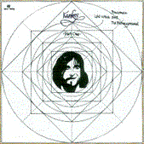![]()
  |

Lola vs. the Powerman & the Money-Go-Round, Part One
The Kinks
Reprise 6423
Released: November 1970
Chart Peak: #35
Weeks Charted: 12
 A corrosively bitter tone is common to almost every song in this album, whether the subject be pop fame (as in "Top of the Pops" -- "It's strange how people want you when your record's high/ 'Cos when it drops down they just pass you by"), the shady business dealings of managers ("The Moneyground" - "But if I ever get mymoney I'll be too old and angry to spend it"), or the mysterious "Powerman" -- "He's got my money and my publishing rights." So much of the content is devoted to disillusionment with fame, money, and success that listening to the album is like reading one of those Hollywood novels, something written, in his later years, by a one-book novelist on his estate in untaxed Switzerland (purchased with his twenty-year Hollywood paychecks as a screen writer) about the cruelty and venality of Hollywood life at the top. It is a very American complaint, and it sounds just as phony and self-pitying a view as ever, even when it issues from the English pop world.
A corrosively bitter tone is common to almost every song in this album, whether the subject be pop fame (as in "Top of the Pops" -- "It's strange how people want you when your record's high/ 'Cos when it drops down they just pass you by"), the shady business dealings of managers ("The Moneyground" - "But if I ever get mymoney I'll be too old and angry to spend it"), or the mysterious "Powerman" -- "He's got my money and my publishing rights." So much of the content is devoted to disillusionment with fame, money, and success that listening to the album is like reading one of those Hollywood novels, something written, in his later years, by a one-book novelist on his estate in untaxed Switzerland (purchased with his twenty-year Hollywood paychecks as a screen writer) about the cruelty and venality of Hollywood life at the top. It is a very American complaint, and it sounds just as phony and self-pitying a view as ever, even when it issues from the English pop world.
Most of the indignation seems to center around the fact that you can't have it both ways, i.e., money-fame-success and artistic self-respect. It can happen, but generally to the great innovators, such as the Beatles, or Picasso, or Hemingway. They are people of great courage or of strong artistic conviction who would never be content to mine the vein of gold that runs through the pop entertainment world. Therefore, the Shavian (Irwin) indignation of those who have conscientiously extracted the ore seems like just crocodile tears.
I hope the Kinks have gotten all this Mr.-Bright-Lights-Asks-What-It's-All-About bunk out of their system with this album and will go back to being the intelligent, perceptive, and highly entertaining group that they have always been.
- Peter Reilly, Stereo Review, 4/71.
Bonus Reviews!
Although "Lola" was an astounding single, the only astounding thing about this album is its relentless self-pity. The evolution of Ray Davies's singing from raunch to whine is now complete; the melodies are still there, but in this context they sound corny rather than plaintive. It's one thing to indulge your nostalgia re village greens, another to succumb to it all over a concept album about modern media. N.b.: bookeepers, song publishers, union reps, and musimoguls aren't all like rats. Key line, from "Got To Be Free": "We've got to get out of this world somehow." B-
- Robert Christgau, Christgau's Record Guide, 1981.
The band's 1970 concept release. The concept involved was the story of a group trying to get a No. 1 hit record. The best thing about the whole affair is the "record" they're promoting: "Lolo," one of the decade's best rock songs. The rest of it is OK, but a bit heavy in the tone of the singing and the lyrics sung. The appreciate the Kinks, one has to have a certain intimacy with their large body of recorded work. Unfortunately, because the band has not garnered a world of commercial success, their better early LPs are frequently deleted, and very little of that material has reached CD yet. It's anyone's guess if it ever will. This album is a fair sampling of one facet. The sound is about equivalent to that of a clean LP. B-- Bill Shapiro, Rock & Roll Review: A Guide to Good Rock on CD, 1991.
Thanks to the number nine hit single "Lola" (about an encounter with a transvestite), Lola vs. the Powerman & the Money-go-round, Part One became a comeback of sorts for the Kinks. Overall, this album is a Davies-eye view of life as an artist coping with the road ("This Time Tomorrow") and the music industry, which includes blackly humorous portrayals of the musician's union ("Get Back in Line"), music publishers ("Denmark Street"), making it big ("Top of the Pops"), and greed ("Money-go-round"). This might be a whinefest from a successful pop artist, but his observations aren't that far off base. Musically, the Kinks still had their ragged delivery, but they increasingly employed more acoustic instrumentation, giving the arrangements a slightly folky quality at times. * * * *
- Rick Clark, The All-Music Guide to Rock, 1995.
The Kinks' career, like so many others', was sidetracked by bad business dealings, succinctly summarized on Lola Versus Powerman and the Moneygoround, Part One, which also gave the band arguably its biggest hit in the ingeniously sly "Lola." * * * * 1/2
- Roger Catlin, Musichound Rock: The Essential Album Guide, 1996.
What can you say about a band led by the Davies boys, the poet laureate of rock & roll (genius Ray) and the father of heavy-metal guitar (Dave)? This concept album explores the life of a group on the brink of its first success with edgy, acerbic, yet tender and quite insightful songs about the ups and downs of stardom. Yeah, these influential Brits are at the peak of their powers here -- and "Lola" still kicks ass! * * * * *
- Zagat Survey Music Guide - 1,000 Top Albums of All Time, 2003.
After years of commercial failure, Ray scored a hit: "Lola" was decades ahead of its time, a gender-bending singalong anthem. He whipped up a concept LP skewering the music biz, with poignant interludes like "Get Back in Line," Dave's "Strangers" and "This Time Tomorrow," immortalized by Wes Anderson in The Darjeeling Limited.
- Rob Sheffield, Rolling Stone, 6/19.
![]() Reader's Comments
Reader's Comments
No comments so far, be the first to comment.
